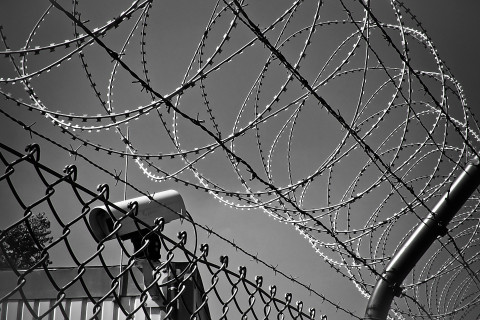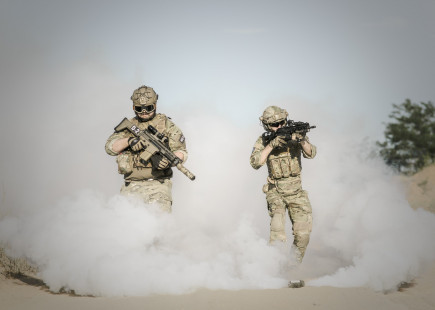An ignoble end to counter-terrorism
Topics
Regions
Global politics have been reshaped since the Global War on Terror was declared in September 2001. As this permanent state of war concludes its twentieth year, we look back on some of the commentaries and critiques penned by TNI's staff, Fellows and Associates on the war and its consequences, many of which proved to be tragically prescient, if not prophetic.

MichaelGaida at Pixabay
The early days
Within a week of the September 11 attacks, TNI Fellow Walden Bello warned against embarking on what he foresaw would be an endless war. He wrote “if there is one thing we can be certain of, it is that massive retaliation on the part of the US will not put an end to terrorism. It will simply amplify the upward spiral of violence.” Bello stressed that unless the root causes of terrorism were addressed, including a reexamination of US foreign policy, we would enter a permanent state of war.
Similarly, the late Praful Bidwai, TNI Fellow, noted that within a week of 9/11 revenge was already in the air, with George W. Bush describing the attacks as “attacks on ‘Western Civilisation’. Bidwai warned against the US meeting the terrorist challenge by countering “force with force, terror with terror, an eye for an eye”.
These nightmarish scenarios of endless war unfolded as predicted, fuelling rather than curbing violence and terror.
Afghanistan and Iraq:
The occupation of Afghanistan and Iraq by Western powers began in 2001 and 2003 respectively.
After eight years of occupation, TNI Fellow Phyllis Bennis, together with David Wildman, authored Ending the US War in Afghanistan arguing that the war must end and highlighting that the “people and government of Afghanistan never represented a threat to the US”. Western forces continued to occupy Afghanistan for a further 12 years, culminating in a disastrous withdrawal that continues to unfold at the time of writing.
Regarding Iraq, in 2007, Praful Bidwai warned that the US was courting disaster, stating that the “United States’ political-military failure in Iraq [would] have terrible consequences” not just for Iraq but “for the entire world”.
Merging Wars:
Afghanistan’s opium trade, coupled with the presence of armed groups such as the Taliban or Al Qaeda, provided an ideal battleground to wage a combined war on drugs and terror, endangering the advances made towards addressing the drug problem. Political leaders, such as former British Prime Minister Tony Blair, tried to cultivate support for the War on Terror by merging it with the War on Drugs, a practice which was called out by TNI’s Drugs and Democracy programme in Merging Wars.
Terrorism – Counter-terrorism:
In 2002, TNI Associate and founding Fellow Peter Weiss critiqued the concept of terrorism and counter-terrorism in international law, writing that while “terrorism has lost much of its luster and now elicits virtually universal condemnation ... a comprehensive definition still eludes the world community”. Nevertheless, states framed acts of violence or the alleged threat thereof as terrorism, and instead of relying on existing criminal justice systems to deal with criminal and political violence, rolled out elaborate counter-terrorism measures.

DariuszSankowski at Pixabay
The security industrial complex
Driving counter-terrorism was an emerging profit-driven security industry. In NeoConOpticon, published in 2009, TNI Fellow, Ben Hayes, warned that that we were turning a blind eye to a new kind of arms race in which all the weapons were pointing inwards. Arms and security companies drove a securitised agenda in the corridors of power in Brussels and Washington and subsequently won contracts to implement militarised security policies. A follow-up report in 2017, Market Forces, showed that in 8 years, the securitised agenda had been consolidated to such a degree that it undermined the foundational principles of a liberal order.
A war on Muslims
As a high-intensity war was being fought in Afghanistan and Iraq, Europe, the US and subsequently other states developed “soft” counter-terrorism measures that overwhelmingly targeted Muslims, Arabs, and people of colour, who were considered “suspect populations”.
The Globalisation of Countering Violent Extremism (CVE) policies and Stranger than Fiction, published in 2018 and 2020 respectively, argue that “CVE policies mutually reinforce and institutionalise a process whereby Muslims are discursively and politically constructed as a threat, and who progressively become subject to expanding techniques of surveillance”.
In the post 9/11 era, much political discourse shifted towards an apparent incompatibility with being both European and Muslim. Legislation was introduced that either specifically targeted, or disproportionately affected, Muslim women. In Muslim Women Don’t Need Saving Nawal Mustafa documented a raft of legislative measures and policies that institutionalised gendered Islamophobia in Europe.
Towards a permanent state of emergency
History has shown that measures taken during a state of emergency tend to stick.
Counter-terrorism policies have normalised restrictions on the right to freedom of expression, particularly on social media and in the arts. Jane Kilpatrick documented how counter-terrorism laws that criminalise vaguely defined concepts such as “extremism” have led to activists and artists self-censoring or being surveilled, censored, and in some cases imprisoned. Kilpatrick also authored When a Temporary State of Emergency becomes Permanent, which revealed that the permanent state of emergency in France had been used “not so much to restore a ‘normal’ state of affairs … but as a pretext to curtail fundamental human rights norms and to pacify dissent”.
Borders
Under a counter-terrorism logic, securitisation and militarism quickly became the norm in borderlands and along migrant routes. Since 2016, TNI has published the Border Wars series which looks at how asylum, movement, and solidarity have been restricted and criminalised as part of this permanent state of war.
Leaving the War on Terror
After almost 20 years of war, TNI associate, Arun Kundnani, together with other critical voices, advocated Leaving the War on Terror and set out a progressive alternative to counter-terrorism policies. Kundnani further argued for the abolition of national security writing that “real security does not come from the elimination of threats but from collective well-being”.
The Global War on Terror and the counter-terrorism architecture it has given rise to have not made us safer after twenty years of war. Predictably, meeting aggression with aggression has fuelled, rather than reduced violence and reinforced racist and imperialist power structures.
UN Special Rapporteur on Human Rights and Counter-Terrorism, Fionnuala Ní Aoláin, writing on the dire situation in Afghanistan fittingly commented recently that “The cynics will be right to judge both our words to prevent and suppress terrorism as meaningless, and our words that suggest the valuing of the lives of ordinary victims of terrorism — men and boys, women and girls — as worthless. It is an ignoble end to counterterrorism”.
